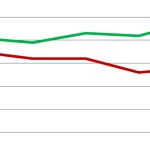Food for All Market Shows Business and Community in the Absence of Regulation
In an attempt to promote her business — Food for All Market, selling products safe for allergy sufferers — Amy Kunkle offered a 50% off coupon through the Web site service Groupon. What happened next is a cautionary tale for any entrepreneur intending to wield the Internet’s answer to big-business tools:
It took only 48 hours to drive a stake into the heart of her fledgling business, Kunkle said in an interview. In just two days in mid-May, Groupon sold 450 of the $30 coupons on her behalf, good for purchases any time in the next three months. …
As she netted just $7.50 for each $30 coupon, after Groupon’s cut, she figures her loss at close to $10,000.
The ploy was supposed to attract a small number of potentially repeat customers; instead it attracted bargain hunters, and $10,000 was a fatal cut to her fledgling enterprise. It’s the sort of story that frequently prompts legislators to take out their regulatory pens to correct the heartless vicissitudes of the free market. But Kunkle didn’t need regulation:
Kunkle’s only marketing effort before Groupon was an e-mail list with more than 500 names. Over the months, Food for All had acquired more than 400 followers on Twitter, and about 450 “likes” on Facebook. When she sent out word to her followers that Food for All was closing, they came to her rescue.
And the response didn’t come merely in the form of increased patronage. It came as loans and offers of volunteer work. In other words, reporter Jeff Gelles’ emphasis is off a bit: It wasn’t the Internet that saved Food for All, but people. Community. The Internet just empowered those people to associate according to related interests and to communicate about circumstances affecting those interests. The result was a very fine and localized adjustment of behavior to repair a short-term error that threatened a long-term community interest, and the process can be repeated as those in the community deem appropriate.
Had government gotten involved, its edicts would have been much less tuned to the specific circumstances and interests involved and would have been certain to bring about unintended consequences with a much more difficult “undo” button.


